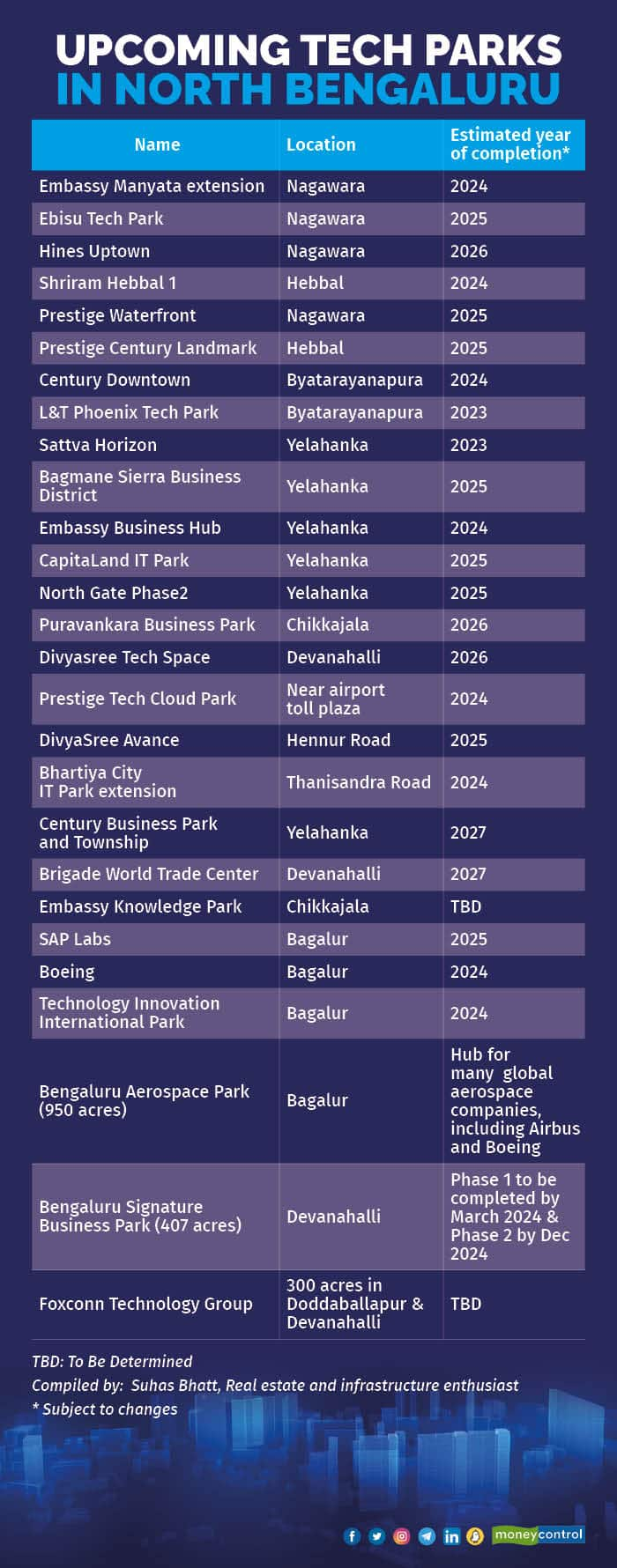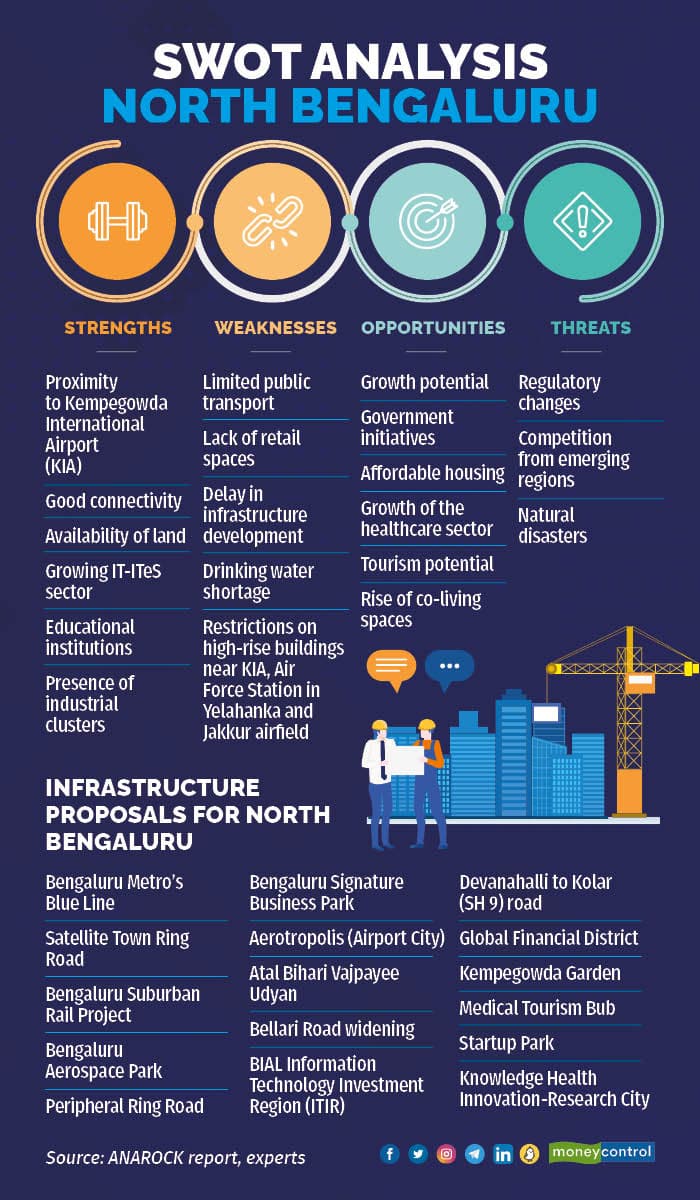



Bengaluru is going north. North Bengaluru, which was among the city's neglected and underdeveloped areas, is now witnessing an unprecedented boom.
An increasing number of tech companies and real estate firms are now setting up business parks, shifting offices to, or opening up new offices in the north of Bengaluru, in areas such as Yelahanka, Jakkur, Hebbal, Thanisandra and Bagalur — an area where Manyata Business Park was once the best and only known landmark.
Now, a whole host of tech parks are slated for completion in 2024 and 2025. Bengaluru-headquartered IT major Infosys, which has a sprawling campus in the city, has leased five lakh sq ft of office space at Northgate, SAP Labs India has started constructing its second office in Devanahalli, Boeing will open its second largest campus also in Devanahalli, and Philips Innovation Campus is relocating its campus this year to Yelahanka.

Airport gives flight to north Bengaluru’s growth
Urban planners cite three major reasons for this growth in the north of the city: the Kempegowda International Airport in Devanahalli that began operations in 2008; Bengaluru Metro’s Blue Line (KR Pura – Yelahanka – KIA) approved in April 2021; and cheaper land prices when compared to the eastern part of the city. At present, Bengaluru's tech industries are primarily located in Outer Ring Road (Central Silk Board - KR Puram), Electronic City, and ITPB in Whitefield.
Ahish Sharma, Bengaluru city head, ANAROCK Group told Moneycontrol that the airport has been a catalyst for the growth of the region, as it has attracted a large number of investors, businesses, and homebuyers. “Infrastructure growth and increasing demand for real estate make it a prime investment destination for both businesses and individuals. As the region continues to grow and evolve, it presents a promising opportunity for investors to capitalise on the potential for future returns,” he said.
Sharma added that as per data, real estate activity in north Bengaluru is the second best after east Bengaluru (where activity is the highest).
“The international airport is the major game changer for this region along with IT parks, Aerospace Park and the BIAL Information Technology Investment Region, leading to its real estate growth over the years. If we are to compare its growth with other zones (east, south and west), then demand for properties has seen a growth here since Covid,” he said.
By number of units sold, north Bengaluru occupied the third spot among Bengaluru’s four regions in 2019, prior to the pandemic. Post-Covid, it’s now only trailing the city’s eastern region.
What’s driving this trend?
North Bengaluru is home to a few IT parks such as Manyata Tech Park in Nagawara and Ecopolis in Yelahanka. The upcoming projects on the airport road (Ballari Road) are expected to decongest ORR, Whitefield and Electronics City.
Suhas Bhatt, an infrastructure and real-estate enthusiast tracking the region’s growth, told Moneycontrol that metro rail connectivity between north Bengaluru and the ORR IT corridor will attract many tech firms to north Bengaluru by 2026.
"The real estate market in north Bengaluru has witnessed a significant appreciation in property prices over the last 10 years, primarily due to KIA which began operations in 2008. The airport has played a crucial role in enhancing the connectivity and accessibility of north Bengaluru, which has led to the development of new infrastructure, including highways, flyovers, and other transportation. Across the globe, airports play a vital role in boosting real-estate activities," he said.
This isn’t to say that all growth in the region is due to the airport. Bhatt also attributes it to the development of the aerospace park, IT, and SEZ zones, and other commercial establishments in north Bengaluru, which, in turn, have contributed to the appreciation of property prices.
“As per the new Karnataka Industrial Areas Development Board (KIADB) regulations, companies should commence operations within five years of land allotment and that also boosted the developments in north Bengaluru. The suburban rail connection to KIA is also an advantage. Hebbal is set to become a major multimodal hub by 2028, with three metro stations and one suburban station," he said.
“These developments have led to an increase in job opportunities, which has further fuelled the demand for housing in the region," Bhatt says.
Urban mobility activist and Associated Chambers of Commerce and Industry of India (ASSOCHAM) Co-chairman (Karnataka chapter), R K Misra, said that companies are relocating to north Bengaluru due to the growing congestion on the ORR and reasonable real-estate pricing.
“Existing companies are expanding within their campuses in places like ORR. The expansion of tech corridors is beneficial for the city. If people are concentrated in one area, it will increase traffic congestion. The under-construction metro corridor to the airport is a positive development,” he said.
Cumulatively these developments have led to an increase in job opportunities, which has further fuelled the demand for housing in the region. These factors are apart from the slew of infrastructure proposals for the region.
Infrastructure proposals to aid growth
The international airport is located around 30 km away from the city’s Central Business District (CBD). While metro's Blue Line (Central Silk Board - KR Puram- Hebbal- KIA) is likely to be ready by 2025-2026, two suburban rail corridors (KSR Bengaluru – Yelahanka – Devanahalli and Heelalige – Yelahanka- Rajanakunte) are expected to be completed by 2028.
Hebbal is set to become Bengaluru’s multi-modal hub with three metro stations (Outer Ring Road- KIA, ORR West Metro (Hebbal to JP Nagar), and Sarjapur-Hebbal. In addition to this, Bengaluru Suburban Rail's Byappanahalli -Yeshwantpur-Chikkabanavara (Mallige) corridor will have a station at Hebbal.
An ANAROCK report from June states that the growth of Hebbal has also led to the development of several shopping malls, restaurants, and recreational centres in the area. “Hebbal is a shining example of how a small village transformed into a highly desirable location for both homebuyers and investors,” it states.

The Karnataka Government is also keen on the Peripheral Ring Road — an eight-lane access-controlled expressway connecting Tumakuru Road and Hosur Road via Hessaraghatta Road, Doddaballapur Road, Ballari Road, Hennur Road, Old Madras Road, Hoskote Road, and Sarjapur Road.
Another proposal is the 288 km-long Bengaluru Satellite Town Ring Road (STRR, NH 948A), a four-six-lane, access-controlled expressway linking satellite towns like Devanahalli, which is in progress. Officials of the National Highways Authority of India (NHAI) said the 80 km Dobbaspet-Devanahalli-Hoskote stretch of STRR will be completed by December 2023.
Governmental plans
The state government is also making an active and focused effort on the region. As per Karnataka Large and Medium Industries Minister, M B Patil, the state government plans to establish a KHIR City (Knowledge Health Innovation-Research City) on 2,000 acres near the airport — to house a university, hospital, and research facilities to aid innovation.
The government is also developing a hi-tech, defence and aerospace park on 2,980 acres (in two phases) in Bagalur. Bengaluru Aerospace Park, which is part of the same project, is a specialised aerospace and aviation industry park, which is spread over an area of 950 acres and has become a hub for many global aerospace companies, including Airbus and Boeing, About 250 acres of the land will be earmarked for a special economic zone in the aerospace hub.
Separately, the Karnataka State Industrial Investment & Development Corporation Limited (KSIIDC) is developing a 407-acre Bengaluru Signature Business Park near the airport that will include a convention centre, media centre, cultural museum, corporate tower (business district) and high-street retail.
The Bengaluru Signature Business Park, a state-of-the-art start-up park, set up at a cost of Rs 30 crore, is envisioned as a hub and incubator for aspiring entrepreneurs from various parts of the state.
The Bengaluru International Airport Area Planning Authority (BIAAPA) region, currently employing around 35,000 people, is also coming up with an aerotropolis development (Airport City), with a high demand for satellite offices and residential units. According to Bangalore International Airport Ltd (BIAL), 'Bengaluru Airport City' will come up on 463 acres of land and is expected to be ready by 2025. It will have a concert area, retail, dining and entertainment village, business park and hotel.
Will it be enough?
While the push certainly is there, experts say that last-mile connectivity continues to be a challenge in north Bengaluru — something that the upcoming metro line could help solve.

“Last-mile connectivity continues to be a hurdle in north Bengaluru. There are few areas in north Bengaluru where last-mile connectivity is still a challenge but once the various projects are ready and more people come and live in these areas, especially those in the periphery, we may see the situation improve,” ANAROCK’s Sharma said.
Drinking water shortage is another major issue that north Bengaluru is facing. Sandeep Anirudhan, Co-founder of the Coalition for Water Security, an NGO, said: 'Karnataka has a water policy, but it is not being implemented. Local water security initiatives should be promoted in north Bengaluru, considering the rise in developmental activities. We need to incentivise shallow water wells, groundwater recharge, and watershed management."
Discover the latest Business News, Sensex, and Nifty updates. Obtain Personal Finance insights, tax queries, and expert opinions on Moneycontrol or download the Moneycontrol App to stay updated!